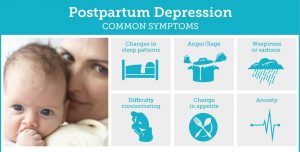
In the initial days and weeks after childbirth, a mother goes through various emotions like awe, joy and bliss. She may also experience difficult feelings, including sadness. Emotions of sadness, that follow childbirth, are known as the ‘Baby Blues’ or ‘Postpartum Blues’. The Baby Blues are common symptoms of postpartum and tend to fade within a week or two. This type of sadness or depression after delivery is often attributed to the dramatic hormonal changes that follow childbirth.
Women that struggle to deal with sadness, anxiety or worry, for several weeks, after giving birth, may have postpartum depression (PPD).
What is postpartum depression?
Postpartum depression is a condition where women experience feelings of extreme sadness, anxiety, and exhaustion which makes it difficult for them to complete daily care activities for themselves or for others.

What causes it?
A number of factors can lead to postpartum depression. Women with a history of depression and other mental health conditions face a higher risk of PPD.
The following factors can also increase one’s risk:
* Hormonal changes that follow childbirth
* Emotional stress, including financial strain, job change, illness, or the death of a loved one
* Changes in social relationships, or lack of a strong support network
* Raising a child with special needs or an infant that is challenging to care for
* Having a family history of mental health issues
While some women are predisposed to experiencing postpartum depression, PPD can affect anyone, including women who experience a normal delivery and give birth to a healthy child.

What are the symptoms of it?
Postpartum depression symptoms may start in the first few weeks following childbirth. Sometimes, symptoms of PPD do not begin until months after birth.
Some of the more common symptoms a woman may experience include:
* Sadness, hopelessness, emptiness, or feeling overwhelmed
* Crying more often than usual and for no apparent reason
* Worrying or feeling overly anxious
* Feeling moody, irritable, or restless
* Oversleeping, or being unable to sleep even when her baby is asleep
* Having trouble concentrating, remembering details, and making decisions
* Experiencing anger or rage
* Losing interest in activities that are usually enjoyable
* Suffering from physical aches and pains, including frequent headaches, stomach problems, and muscle pain
* Eating too little or too much
* Withdrawing from or avoiding social gatherings
* Having trouble bonding or forming an emotional attachment with her baby
* Persistently doubting her ability to care for her baby
* Thinking about harming herself or her baby.

How can postpartum depression be treated?
If you are showing symptoms of postpartum depression, talk to your doctor or a mental health professional. Your doctor may suggest that new mothers meet regularly with a counsellor or that you start taking antidepressant medications. Often, both types of treatment are recommended. While PPD does, at times, go away on its own, symptoms usually go away more quickly with the help of medication and talk therapy.
Lifestyle changes can also help to reduce some symptoms of postpartum depression. The following strategies may help you manage the increased stress that accompanies new parenthood:
* Getting enough sleep
* Finding time to exercise
* Surrounding yourself with a supportive network of family and friends
* Eating regular, nourishing meals
* Asking others to watch your child so that you can have a much-needed break
Here’s postpartum depression broken down for you. We wish all you new mothers out there a happy motherhood and hope you kick postpartum depression in the back!









